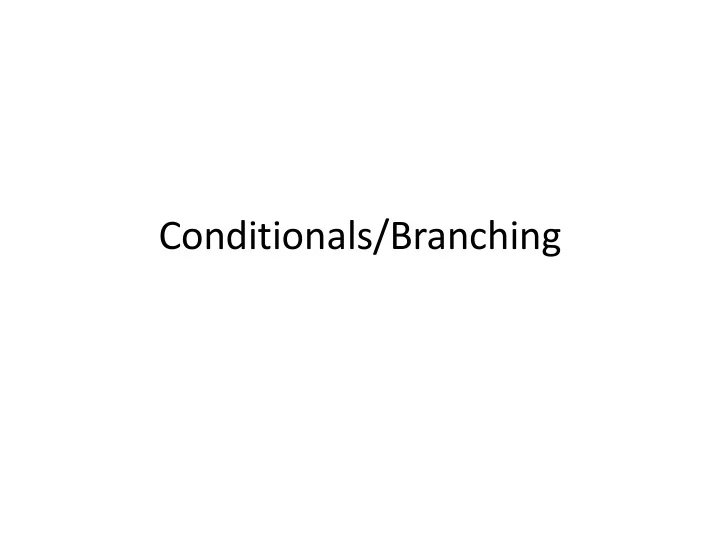

Conditionals/Branching
exam1 = int(input("What is your first exam score? ")) exam2 = int(input("What is your second exam score? ")) exam3 = int(input("What is your third exam score? ")) average = (exam1 + exam2 + exam3) / 3 print("Your exam average is", average)
exam1 = int(input("What is your first exam score? ")) exam2 = int(input("What is your second exam score? ")) exam3 = int(input("What is your third exam score? ")) average = (exam1 + exam2 + exam3) / 3 extra_pts = int(input("How many extra credit points did you earn? ")) average = average + extra_pts print("Your exam average is", average)
exam1 = int(input("What is your first exam score? ")) exam2 = int(input("What is your second exam score? ")) exam3 = int(input("What is your third exam score? ")) average = (exam1 + exam2 + exam3) / 3 choice = input("Did you do the extra assignment? ") if choice == "yes": "If" average = average + 5 statement print("Your exam average is", average)
Statement Statement Statement Statement Statement Statement Statement
Statement IF Statement Statement Statement Statement Statement Statement
The condition if condition : must be something statement that is True or False. statement more statements… statement statement more statements…
• Conditions are often built from the relational operators: == != < <= > >= • These operators compare two values, and give you back a true/false value. • Can compare ints, floats, or strings. – ints and floats are comparable to each other. – strings are only comparable to other strings.
a = 1 x = "hello" b = 2 y = "computer" c = 3 z = 141 a < b x == "hello" a + 1 < b x == "Hello" a + 1 <= b x < y c == 3 x < "Hello" a + b != 3 x < z
Suppose we want to write a program to figure out if someone should be paid overtime (if they work more than 40 hours per week). hours_per_day = float(input("Hours per day? ")) days_per_week = int(input("Days per week? ")) if ___???___: print("You should get paid overtime!") hours_per_day * days_per_week > 40 40 < hours_per_day * days_per_week
Suppose I'm buying doughnuts for my colleagues. The store has chocolate doughnuts and powdered sugar doughnuts. But my colleagues are only happy if I buy exactly one more chocolate doughnut than the number of powdered sugar doughnuts I buy. num_choc = int(input("How many chocolate? ")) num_sugar = int(input("How many sugar? ")) if ___???___: print("Happy colleagues") num_choc – 1 == num_sugar num_choc == num_sugar + 1 num_choc – num_sugar == 1
• If statement: – Run some extra statements if a condition is true. • But what if you want run one set of statements if a condition is True , and a different set of statements if the condition is False ?
if condition : statement more statements… else : statement more statements… more statements…
Statement IF condition is False condition is True Statement Statement Statement Statement Statement Statement
exam1 = int(input("What is your first exam score? ")) exam2 = int(input("What is your second exam score? ")) exam3 = int(input("What is your third exam score? ")) average = (exam1 + exam2 + exam3) / 3 choice = input("Did you do the extra assignment? ") if choice == "yes": print("Your exam average is", average + 5) else: print("Your exam average is", average)
• Write a program that asks the user to type in his or her age, and prints whether or not they are (legally) able to drink. [use if-else] • Write a program that asks the user if they want to calculate the area of a square or a triangle. (The user will type in square or triangle .) – If they enter square , then ask the user for the length of a side and print the area. – If they enter triangle , then ask the user for the base and height and print the area.
x = 1 y = 2 z = 3 if x < y: x = x + 1 z = x - 1 if y < z: y = y – 1 if x < y: x = x + 1 else: z = z + x + 1 print(x, y, z)
Recommend
More recommend